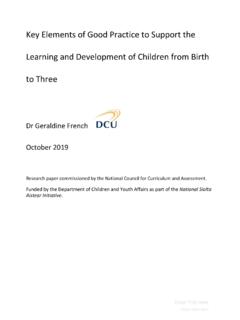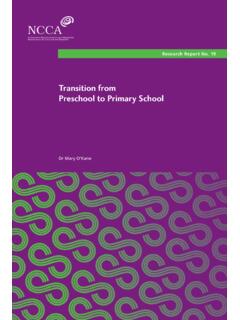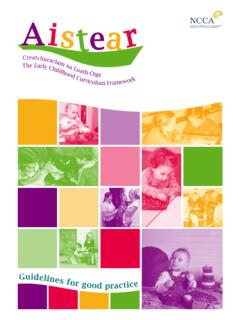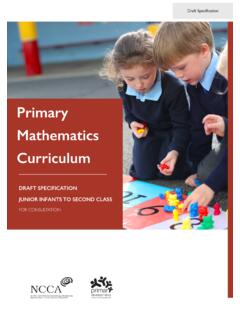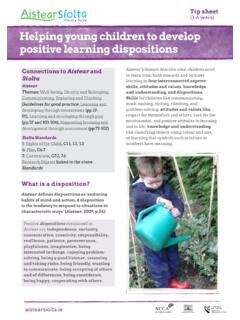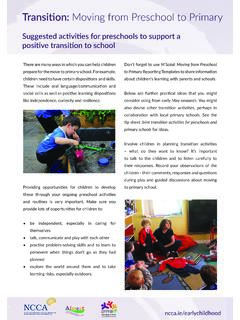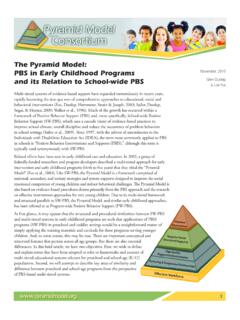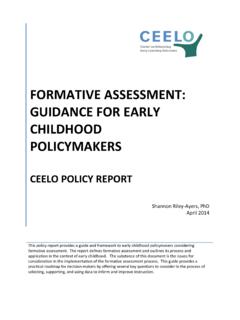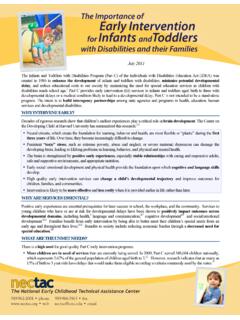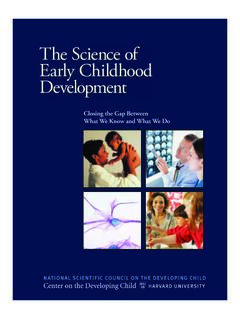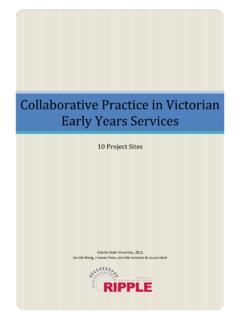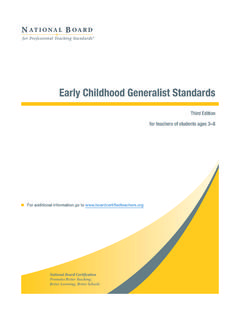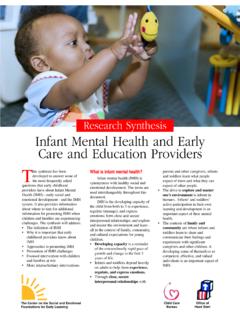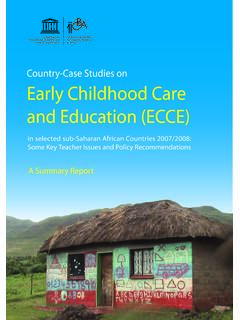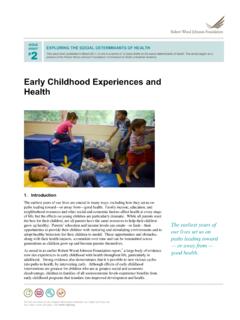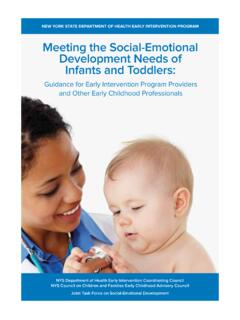Transcription of Mathematics in Early Childhood and Primary Education (3-8 ...
1 research Report No. 18 Mathematics in Early Childhood and Primary Education (3-8 years)Teaching and Learning Th r se Dooley, Elizabeth Dunphy and Gerry ShielWith Deirdre Butler, Dolores Corcoran, Th r se Farrell, Si n NicMhuir , Maura O Connor, and Joe TraversInternational Advisor: Professor Bob Perry NCCA 2014 ISSN 1649-3362 National Council for Curriculum and Assessment 35 Fitzwilliam Square, Dublin : +353 1 661 7177 F: +353 1 661 7180 E: in Early Childhood and Primary Education (3 8 years)Teaching and Learning Th r se Dooley, St. Patrick s College, Dublin Elizabeth Dunphy, St. Patrick s College, Dublin Gerry Shiel, Educational research Centre, DublinDeirdre Butler, St.
2 Patrick s College, DublinDolores Corcoran, St. Patrick s College, DublinTh r se Farrell, St. Patrick s College, DublinSi n NicMhuir , St. Patrick s College, DublinMaura O Connor, St. Patrick s College, DublinJoe Travers, St. Patrick s College, DublinProfessor Bob Perry, Charles Sturt University, AustraliaEducational research CentreForas Taighde Ar OideachasResearch conducted on behalf of the National Council for Curriculum and Assessment 20142 research Report No. 18 Mathematics in Early Childhood and Primary Education (3 8 years)Acronyms AAMT Australian Association of Mathematics TeachersAistear The Early Childhood Curriculum Framework (2009)ACARA Australian Curriculum, Assessment and Reporting AuthorityAfA Achievement for All (UK intervention)ASD Autistic Spectrum Disorders CCEA Council for Curriculum, Examinations and Assessment (Northern Ireland)CCK Common Content KnowledgeCCSSM Common Core States Standards for Mathematics (United States)COMET Cases of Mathematics Instruction to Enhance Teaching (Silver et al.)
3 , 2007)CPD Continuing Professional DevelopmentDEIS Delivering Equality of Opportunities in SchoolsDES Department of Education and Skills (formerly Department of Education and Science)ECA Early Childhood AustraliaECCE Early Childhood Care and Education EMS European Mathematical Society HSCL Home School Community Liaison (Ireland)ICT Information and Communications TechnologyIWB Interactive White BoardKCC Knowledge of Content and CurriculumKCS Knowledge of Content and StudentsKCT Knowledge of Content and TeachingKQ Knowledge Quartet (Rowland, Huckstep, & Thwaites, 2005)MKT Mathematical Knowledge for TeachingNAEYC National Association for the Education of Young Children (United States)NCCA National Council for Curriculum and AssessmentNCTM National Council of Teachers of Mathematics (United States)NRC National research Council (United States)PCK Pedagogical Content KnowledgePSMC Primary School Mathematics Curriculum (1999)PUFM Profound Understanding of Fundamental Mathematics (Ma,1999)REPEY Researching Effective Pedagogy in the Early Years (Siraj-Blatchford et al.
4 , 2002)RME Realistic Mathematics Education SCK Specialised Content KnowledgeSEND Special Educational Needs and Disabilities SES Socioeconomic statusSKIMA Subject Knowledge in Mathematics (Rowland, Martyn, Barber, & Heal, 2001)SSP School Support ProgrammeTAL Tussendoelen Annex Leerlijinen (In Dutch); Intermediate Attainment Targets (in English) TIMSS Trends in International Mathematics and Science Study3 Table of ContentsTable of ContentsExecutive Summary .. 7A View of Mathematics .. 8 Context .. 9 Practices .. 9 Curriculum 10 Curricular 11 Partnership with 12 Teacher Preparation and Development.
5 12 Key Implications .. 20 Curriculum .. 21 Curricular Supports .. 22 Chapter 1: Good Mathematics Pedagogy .. 23 Starting with 24 Principles that Emphasise People, Relationships and the Learning Environment .. 26 Principles that Emphasise Learning .. 27 Engaging Children s 28 Integrating Factual Knowledge and Conceptual Frameworks .. 29 Promoting a Metacognitive Approach .. 30 Features of Good Mathematics 31 Conclusion .. 33 Chapter 2: Teaching Practices .. 36 Promotion of Math Talk .. 37 Development of a Productive Disposition .. 404 research Report No. 18 Mathematics in Early Childhood and Primary Education (3 8 years)Emphasis on Mathematical Modeling.
6 41 Cognitively Challenging Tasks .. 43 Formative Assessment .. 44 Practices in Integrative Contexts .. 45 Play .. 46 Story/Picture-Book Reading .. 48 Project 53 Learning Mathematics through the Arts and Physical 55 Digital Tools .. 58 Conclusion .. 62 Chapter 3: Curriculum 63 Curriculum 65 Curriculum Goals .. 65 Mathematical Processes .. 66 Reasoning .. 67 Argumentation .. 68 Generalising .. 68 Representing .. 69 Problem-Solving .. 70 Connecting .. 70 Content Areas .. 72 Measurement .. 74 Geometry and Spatial Thinking .. 76 Algebraic 78 Data and 80 Content Areas and Curriculum 80 Conclusion.
7 82 Chapter 4: Curricular 85An Equitable 865 Table of ContentsExceptional 87 Children with Intellectual and Developmental 87 Children with Hearing 87 Children with Visual Impairment .. 88 Children with Autistic Spectrum Disorders .. 88 Mathematically-talented Children .. 88 Children in Culturally Diverse Contexts .. 89 English Language Learners .. 89 Children Learning Mathematics through Irish .. 90 Children in Socioeconomically Disadvantaged Contexts .. 91 Early Intervention .. 93 Allocation of Time to Teaching Mathematics .. 93 Preschool 94 Primary School 95 Emphasis on Different Mathematics Content Areas.
8 97 Mathematics Across the Curriculum .. 98 Conclusion .. 100 Chapter 5: Partnership with 101 Parents and their Children s Mathematical 102 Communicating with Parents about Mathematics .. 104 Sharing Information with 105A Two-way Flow of 105 Technology and Communicating with Parents .. 107 Parents and Children Discuss Mathematics .. 107 Parents and Teachers Collaborating about Mathematics Learning .. 108 Parent and Child Collaborating about Mathematics .. 110 Conclusion .. 111 Chapter 6: Teacher Preparation and 113 The Goal of Mathematics Teacher 115 Mathematical Knowledge for Teaching (MKT).
9 115 MKT research in Ireland .. 116 Profound Understanding of Fundamental Mathematics .. 1166 research Report No. 18 Mathematics in Early Childhood and Primary Education (3 8 years) Doing 117 Frameworks for Thinking about 118 The Knowledge 118 Effective Teachers Framework .. 121 Using Tools for Teacher 121 Mathematics Teacher Development (CPD) .. 122 Conclusion .. 123 Chapter 7: Key 129 References .. 133 Acknowledgements The authors thank the National Council for Curriculum and Assessment for commissioning and supporting this report. They are very thankful to Arlene Forster and Aoife Kelly of the NCCA for providing detailed feedback on earlier drafts of the report.
10 They are also indebted to Professor Bob Perry, Charles Sturt University Australia who read Early drafts of the report and who provided expert advice on various issues addressed in the executive summaries of reports No. 17 and No. 18 are available online at The online versions include some hyperlinks which appear as text on dotted lines in this print Summary8 research Report No. 18 Mathematics in Early Childhood and Primary Education (3 8 years)The review of research on Mathematics learning of children aged 3 8 years is presented in two reports. These are part of the NCCA s research Report Series (ISSN 1649 3362).

